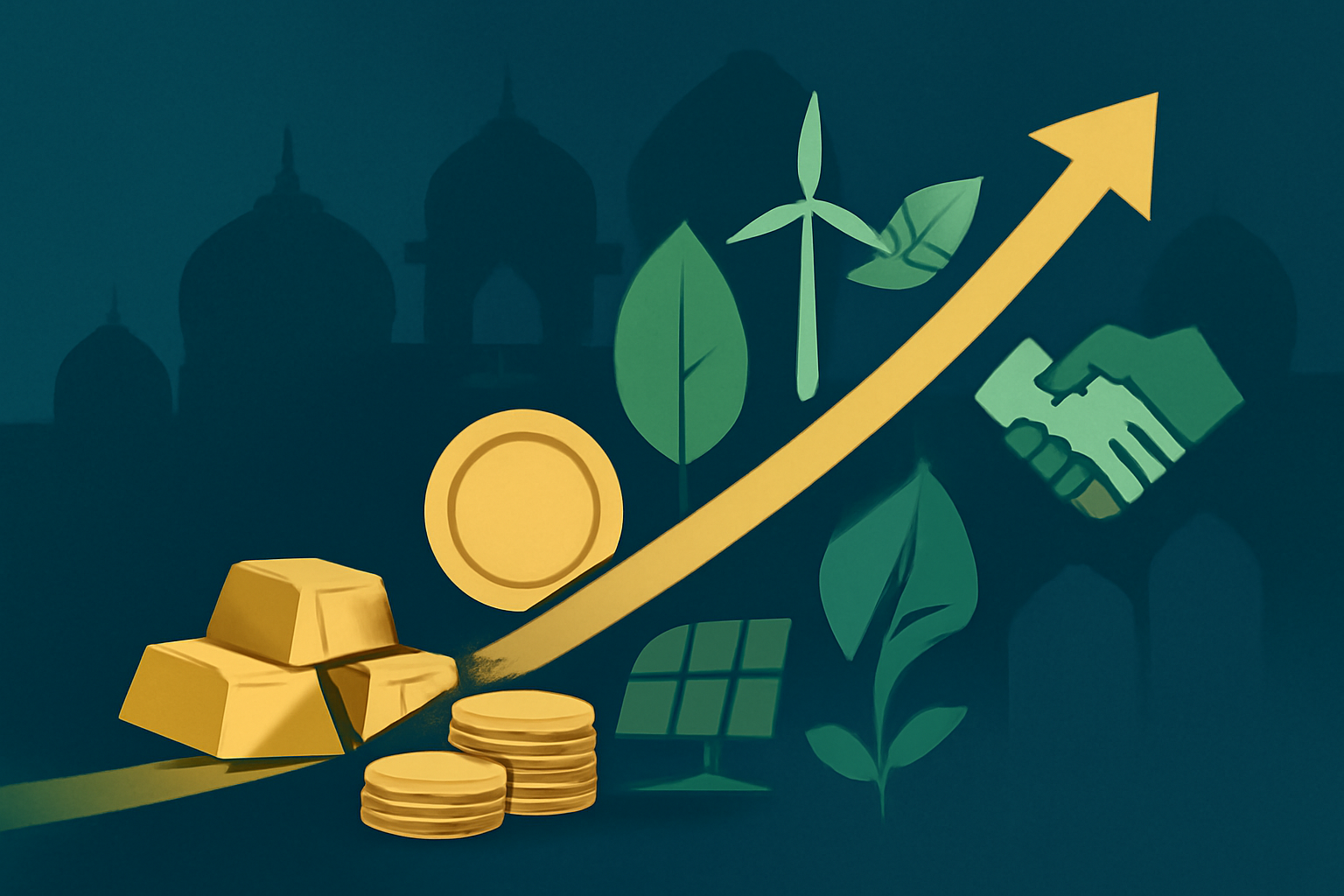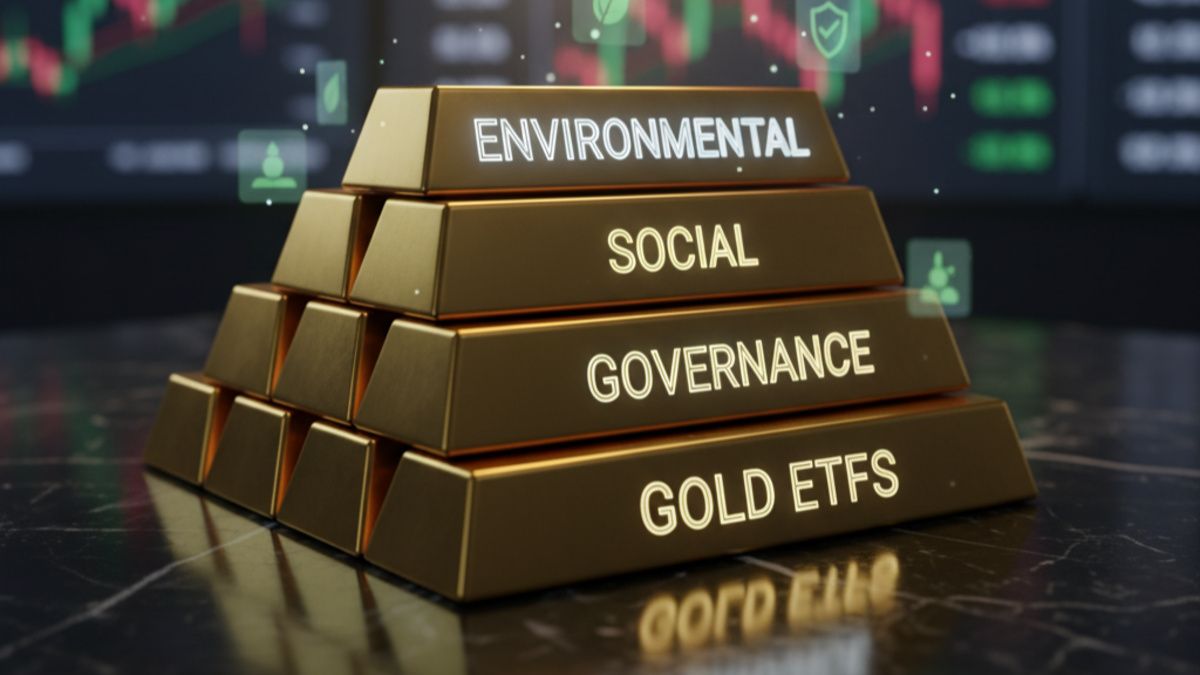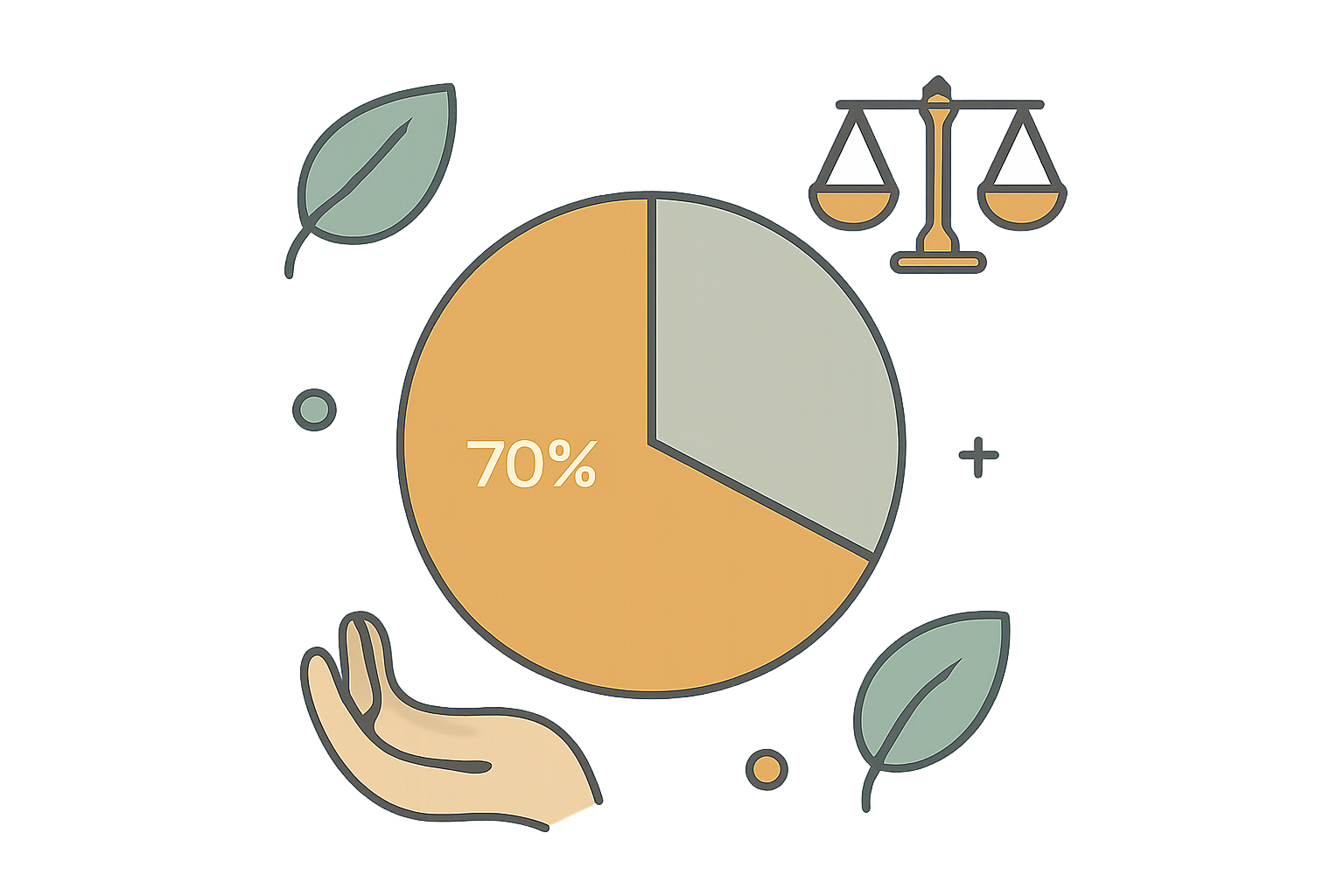Introduction to ESG and Its Growing Role in Gold Investments
What is ESG Investing?
What if your gold investments could create wealth and drive positive change?
This is the promise of ESG Gold ETFs — a new era of investing where profit aligns with purpose. ESG stands for Environmental, Social, and Governance principles, the three pillars that measure a company’s ethical and sustainable impact beyond just financial returns.
Traditional gold investments have focused solely on price and stability. But today’s investors, especially in India, are looking deeper — asking how gold is sourced, processed, and traded. ESG investing answers these questions by prioritizing companies and funds that follow responsible mining practices, ensure fair labor standards, and maintain transparent governance.
Environmental factors examine a company’s ecological footprint, including energy usage, waste management, and climate change initiatives. Social aspects evaluate how businesses handle relationships with employees, suppliers, customers, and local communities. Governance looks at leadership structure, executive compensation, shareholder rights, and transparency.
 What makes ESG investing particularly attractive is its pursuit of a triple bottom line – generating positive outcomes for people and the planet while still delivering profits. This holistic approach aligns financial objectives with broader societal goals.
What makes ESG investing particularly attractive is its pursuit of a triple bottom line – generating positive outcomes for people and the planet while still delivering profits. This holistic approach aligns financial objectives with broader societal goals.
The growing interest in sustainable gold ETFs shows that ethical investing no longer means compromising on returns. In fact, research suggests ESG-focused funds can match or even outperform conventional investments over time. This shift is driving a powerful transformation in India’s financial markets, where gold has always been a cornerstone asset.
As ESG principles gain traction, Gold ETFs are evolving from a simple safe-haven investment into a tool for building wealth responsibly — benefiting investors, communities, and the planet.
ESG Gold ETFs typically exclude sectors like tobacco, weapons, fossil fuels, and gambling, focusing instead on companies demonstrating strong sustainability practices. For investors interested in gold investing, this means looking beyond just the price of the precious metal to consider how it’s sourced and processed.
The Rise of ESG in the Indian Financial Market
The Indian financial landscape is experiencing a significant transformation with ESG investing gaining substantial momentum.
 As sustainability concerns become more prevalent globally, Indian investors are increasingly looking for ways to align their portfolios with their values.
As sustainability concerns become more prevalent globally, Indian investors are increasingly looking for ways to align their portfolios with their values.
While gold has traditionally been a cornerstone investment in Indian portfolios, the way investors approach gold investing is evolving. ESG-conscious investors are now looking beyond conventional gold mutual funds and gold ETFs to understand the ethical implications of their investments.
Though the Indian ESG investment ecosystem is still in its developmental stages, it’s growing rapidly. The market currently offers a limited but expanding selection of sustainable funds, including some that may incorporate responsibly sourced gold in their portfolios. Several asset management companies have launched ESG-focused products, with more expected to follow as demand increases.
Interestingly, ESG indices in India have shown a promising trend of potential outperformance compared to conventional market benchmarks. This suggests that investing with ethical considerations in mind doesn’t necessarily mean compromising returns – an important factor for investors considering the switch to sustainable gold ETFs or other ESG investments.
As regulations evolve and awareness grows, we can expect to see more robust ESG integration across Indian financial products, including those focused on precious metals like gold.
The Intersection of Gold ETFs and ESG Principles in India
Understanding Gold ETFs
Gold ETFs represent a modern approach to gold investing, allowing investors to gain exposure to the precious metal without physical ownership concerns. These financial instruments track gold prices and trade on stock exchanges like regular shares, making them accessible to everyday investors through standard brokerage accounts.
In India, where gold holds cultural and financial significance, Gold ETFs have gained popularity for several compelling reasons. They eliminate storage worries, insurance costs, and authentication concerns that come with physical gold possession. Each unit typically represents 1 gram of gold (or a similar fixed quantity), backed by actual gold held by the fund.
Research suggests that Gold ETFs demonstrate remarkable resilience during market downturns compared to spot gold and futures in the Indian market context. This stability makes them attractive for portfolio diversification and hedging against market volatility.
The Indian ETF landscape is evolving rapidly, with specialized ESG-focused options emerging. For instance, the Mirae Asset Nifty 100 ESG Sector Leaders ETF exemplifies how sustainability principles are being integrated into the exchange-traded fund ecosystem, though specifically ESG-focused gold ETFs remain in early developments.
The Emerging ESG Narrative in Indian Gold ETFs
Ethical investment considerations are increasingly reshaping India’s capital markets, including the gold ETF segment. While dedicated ESG Gold ETFs might still be developing, the broader momentum toward responsible investing is already influencing how investors perceive and approach gold investments.
Today’s gold investors seek more than just financial returns. They want alignment between their portfolio and personal values without sacrificing competitive performance or risk management. This value-driven approach marks a significant shift in investment philosophy across India’s financial landscape.
The gold industry’s focus is gradually shifting toward sustainable and ethical sourcing throughout the value chain.
 Investors are becoming more conscious about the origins of their gold investments, pushing fund managers to consider environmental impact, labor practices, and governance issues in their gold procurement processes.
Investors are becoming more conscious about the origins of their gold investments, pushing fund managers to consider environmental impact, labor practices, and governance issues in their gold procurement processes.
Challenges and Opportunities for ESG Gold ETFs in India
Implementing ESG principles in Gold ETFs faces significant hurdles in India. Ensuring ethical gold sourcing remains complex, with persistent issues like smuggled gold entering supply chains and concerns about exploitative labor practices, including child labor in some mining operations.
Despite these challenges, consumer sentiment is shifting dramatically. More buyers now actively seek ethically produced gold, creating market demand for transparent, responsibly sourced products. This consumer preference represents a powerful force driving change throughout the gold industry.
A major obstacle to ESG integration in Gold ETFs is the lack of standardized reporting frameworks and verification mechanisms specific to gold sourcing. Without uniform standards, investors struggle to compare ESG credentials across different gold investment products.
The greatest opportunity lies in developing robust, transparent supply chains with verifiable certifications. Gold ETF providers who can demonstrate genuine commitment to ethical sourcing will likely gain competitive advantage as ESG investing continues gaining momentum in India. This evolution represents the next frontier in the long history of gold mutual funds and ETFs in the country.
Ethical Sourcing and Governance in the Gold Industry
 Ethical Sourcing Standards for Gold
Ethical Sourcing Standards for Gold
When we talk about gold investing today, sustainability has become a crucial consideration. Ethical sourcing in the gold industry means ensuring that precious metals are obtained through responsible practices that address environmental impact, fair labor conditions, and positive community relationships. For investors in gold ETFs, understanding these standards is becoming increasingly important.
In India, where gold holds cultural significance beyond just investment value, the movement toward responsibly sourced gold is gaining momentum. Legally sourced gold comes with verification of its origin, ensuring it hasn’t been extracted from conflict zones or through illegal mining operations that often involve exploitation and environmental degradation.
Several globally recognized standards now guide ethical practices in the gold industry. Fairmined and Fairtrade Gold certifications have seen growing adoption in India, providing frameworks that ensure miners receive fair compensation and work under safe conditions. These standards are particularly relevant for gold mutual funds and ETFs that aim to incorporate ESG investing principles into their operations.
A significant focus in ethical gold sourcing lies in addressing challenges related to artisanal and small-scale mining operations. These smaller operations often lack resources for proper environmental management but represent a vital livelihood for many communities across gold-producing regions. Responsible gold ETFs are increasingly looking at how these operations can be supported while improving their environmental and social practices.
Governance and Transparency in Gold Supply Chains
Strong governance systems form the backbone of ethical practices throughout the gold supply chain. The OECD Due Diligence Guidance for Responsible Supply Chains of Minerals from Conflict-Affected and High-Risk Areas has emerged as a key framework for companies involved in gold trading, including those behind gold ETFs.
This framework requires companies to establish strong management systems, identify and assess risks, design strategies to respond to these risks, conduct independent audits, and report on due diligence efforts.
 For investors in gold mutual funds, this level of transparency offers reassurance about the ethical standards behind their investments.
For investors in gold mutual funds, this level of transparency offers reassurance about the ethical standards behind their investments.
In India’s growing ESG investing landscape, transparency in gold supply chains does more than just build customer trust—it creates a foundation for sustainable business practices. Companies managing gold ETFs are increasingly adopting ethical sourcing policies not just as a moral obligation but as a strategic business decision that enhances their reputation and appeals to socially conscious investors.
The Role of Certifications and Industry Initiatives
The gold industry has developed various certifications that provide assurance of ethical and sustainable practices. For investors looking at gold ETFs through an ESG investing lens, these certifications serve as important indicators of responsibility.
Industry initiatives such as the Responsible Minerals Initiative and the Responsible Jewellery Council have established standards specifically addressing gold sourcing challenges. These initiatives encourage companies to conduct due diligence and verify that their gold comes from responsible sources.
Even major gold exporters are now advocating for ethical sourcing practices, recognizing that consumers and investors alike are demanding greater accountability. In India, where gold is deeply embedded in cultural traditions and investment portfolios, these certification programs are helping transform how gold is sourced, traded, and ultimately represented in financial products like gold ETFs.
The Future of ESG in Indian Gold ETFs and Investor Considerations
Investor Demand for Sustainable Gold Investments
The landscape of gold investing in India is undergoing a significant transformation driven by growing ethical consciousness. Recent market research reveals that over 70% of gold jewelry buyers now express a strong preference for ethically produced pieces, reflecting a broader shift in consumer values.
This preference isn’t limited to physical gold purchases but extends into investment vehicles like gold ETFs and gold mutual funds.
This surge in demand isn’t merely a passing trend but represents a fundamental shift in how investors approach their portfolios. Indian investors are becoming increasingly aware of the environmental and social impact of gold mining operations, from water pollution to labor practices. As awareness grows, they’re seeking investment options that align with their personal values while still offering exposure to gold as an asset class.
The demand for sustainable gold investments is creating ripple effects throughout the financial ecosystem. Fund managers are responding by integrating ESG principles into their gold ETFs, creating products that satisfy both financial objectives and ethical considerations. This consumer-driven push is perhaps the most powerful catalyst accelerating the ESG narrative in India’s gold investment landscape.
Evolving ESG Landscape for ETFs in India
The Indian ETF market, while still developing compared to Western counterparts, is quickly adapting to include ESG considerations. Analysts predict that by 2025, a significant portion of newly launched ETFs in India will incorporate some form of ESG criteria, including those focused on gold investing.
Regulatory bodies and market participants are working together to develop robust ESG frameworks specifically designed for the Indian market context. These frameworks aim to address the unique challenges of implementing ESG criteria in gold supply chains, particularly given India’s position as one of the world’s largest gold consumers.
The trend toward sustainable finance is gaining momentum across India’s investment landscape, with ESG-focused funds seeing consistent inflows despite broader market volatility. Gold ETFs are perfectly positioned to benefit from this shift, as they combine the traditional safe-haven appeal of gold with the growing demand for responsible investment options.
Key Considerations for Investors
Investors looking to participate in the ESG gold ETF space should consider several important factors:

- ESG Criteria Transparency: Look for funds that clearly define their ESG criteria and how these standards apply specifically to gold sourcing and production. Not all ESG approaches are equal, and some may prioritize certain aspects over others.
- Fund Manager Commitment: Assess the fund manager’s track record and genuine commitment to sustainability rather than just marketing. Some fund houses have dedicated ESG research teams, while others may take a more superficial approach.
- Supply Chain Verification: Examine how the ETF verifies ethical sourcing throughout the gold supply chain. Leading gold ETFs are increasingly publishing detailed reports on their sourcing practices and third-party verifications.
- Performance Metrics: Consider both financial performance and ESG impact. The best ESG gold ETFs aim to deliver competitive returns while maintaining strict ethical standards. Historical data suggests that ESG gold mutual funds don’t necessarily underperform conventional alternatives.
- Fee Structure: ESG verification often involves additional costs, which may be reflected in slightly higher expense ratios. Evaluate whether these costs are reasonable given the added ethical value.
As ESG investing continues to mature in India, investors who carefully navigate these considerations can build portfolios that align with both their financial goals and values.
Conclusion: Towards Responsible Gold Investment
The investment landscape in India is undergoing a remarkable transformation, with ESG principles steadily gaining prominence in shaping investment strategies. What was once considered a niche approach is now becoming mainstream as investors increasingly recognize the importance of aligning their financial goals with broader societal and environmental considerations.
Gold ETFs, traditionally viewed primarily as safe-haven investments, are now evolving to reflect this shifting narrative. Fund managers and gold industry stakeholders are paying closer attention to ethical sourcing practices and implementing stronger governance frameworks. This evolution isn’t happening in isolation – it’s part of a broader movement toward responsible investing across various asset classes.
Investor demand has emerged as perhaps the most powerful catalyst for change in the gold investment ecosystem. As awareness about ethical issues in gold mining increases, investors are becoming more discerning about where and how their investment money flows. Many gold investors now actively seek information about the origin of the gold backing their ETFs and mutual funds, pushing fund managers to improve transparency and accountability.
The Path Forward
For the gold industry to truly embrace sustainability, the continued development of transparent and verifiable ESG practices is essential. This includes establishing clear traceability systems that track gold from mine to market, implementing rigorous environmental standards at extraction sites, and ensuring fair labor practices throughout the supply chain.
 Gold ETFs and mutual funds that can demonstrate these commitments will likely gain competitive advantages in an increasingly conscious marketplace.
Gold ETFs and mutual funds that can demonstrate these commitments will likely gain competitive advantages in an increasingly conscious marketplace.
Greater collaboration between industry stakeholders, regulators, and investors will be crucial to driving meaningful progress. Industry associations need to work with government bodies to establish and enforce standards that promote responsible gold investing. Meanwhile, investors must continue demanding accountability and transparency from gold fund managers, creating market incentives for positive change.
Looking ahead, the future of gold investing in India will almost certainly see a stronger emphasis on sustainability and ethical considerations. This shift doesn’t mean compromising on returns – rather, it represents an evolution toward a more holistic understanding of value. As ESG investing continues to mature in India, gold investments that align with these principles may even outperform their conventional counterparts by mitigating long-term risks and capturing emerging opportunities.
For individual investors considering gold ETFs or gold mutual funds, this evolution presents both challenges and opportunities. Taking time to research a fund’s ESG credentials, understanding its sourcing policies, and evaluating its commitment to transparency will become increasingly important parts of the investment decision process. By doing so, investors can contribute to positive change while potentially enhancing their long-term returns.
The path toward fully responsible gold investment in India may be gradual, but the direction is clear. As ESG principles become further integrated into the financial ecosystem, gold’s eternal value will increasingly be measured not just in karats and returns, but in its contribution to a more sustainable and equitable world.
Disclaimer: This article is for educational purposes only and should not be considered financial or investment advice. ESG Gold ETFs and other investment products involve risks, and past performance is not indicative of future results. Please consult a qualified financial advisor before making any investment decisions. The views expressed are solely for informational purposes and do not represent any specific product recommendation.



 Ethical Sourcing Standards for Gold
Ethical Sourcing Standards for Gold

